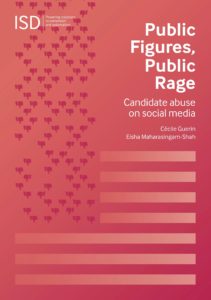
(October 23, 2020) While public figures have always been game for rebuke and revile, the hate speech directed towards them has grown exponentially over the past five years. And not all of the invective is online or in words only. Thirteen members of so-called militias with a white-nationalist bent were arrested in a planned kidnap and possible assassination attempt on Michigan governor Gretchen Witmer.
In Canada in August, a man approached constituency office of Catherine McKenna, Liberal MP and minister of infrastructure and communities, filming himself as he launched into a profane tirade, calling the minister a “c—t.” He later posted his video on social media.
In 2016, the U.K. Labour MP Jo Cox was brutally murdered outside her home by a white supremacist at a time of increasing far-right sentiment in the UK.
Following its recent study on the rise of hate and white extremism in Canada, the Institute of Strategic Dialogue (ISD), has just released a report—Public Figures, Public Rage: Candidate Abuse on Social Media by Cécile Guerin and Eisha Maharasingam-Shah—on how “gender, ethnicity and party affiliation might play a part in determining the level and type of abuse candidates receive on mainstream social media platforms,” such as Facebook and Twitter.
Based in London with offices in Beirut, Berlin, London, Paris and Washington DC and founded in 2006, the ISD is the world’s biggest think tank focused on the rising tide of polarisation, hate and extremism and what can be done about it. The conclusion of its Environmental Scan of Right-wing Extremism in Canada, which The Charity Report wrote about in June, was that Muslims and the prime minister were main targets of their abuse.
In this latest report, ISD studied hate speech and abuse directed at U.S. Congressional candidates during the 2020 US presidential campaign. Its key findings are:
- Women were far more likely than men to be abused on Twitter, with abusive messages making up more than 15% of the messages directed at every female candidate analysed, compared with around 5–10% for male candidates. The only exception to this trend was Republican Senator Mitch McConnell: 27% of the messages he received were classified as abusive.
- Women of ethnic minority backgrounds were particularly likely to face online abuse.
On Twitter, Democratic Congresswoman Ilhan Omar (Somali–American) received the highest proportion of abusive messages of all candidates reviewed, at 39%. Democratic Congresswoman Alexandria Ocasio- Cortez (Puerto-Rican–American) received the highest proportion of abusive comments on Facebook. - Conversely, male politicians of ethnic minority backgrounds did not appear more vulnerable to abuse than their white counterparts. Democratic Senator Cory Booker and Republican Senator Tim Scott (both African–American) received levels of abuse similar to white male candidates, although the abuse was more likely to be racialised.
- Both on Twitter and Facebook, abuse targeting women was more likely to be related to their gender than that directed at men, with abuse attacking female candidates based on their physical appearance and perceived lack of competence. Conversely, abuse targeting men was more generalised, often attacking their political stances.
- On Facebook, female Democrats received ten times more abusive comments than their male counterparts, while Republican women received twice as many abusive comments as Republican male peers. The exception was Mitch McConnell who received the most abuse of
all male candidates both on Twitter and Facebook, with levels approaching or sometimes higher than female counterparts.
The study says that, aside from the acute effect hate speech has on its individual victims, the abuse is “an impediment to democratic societies, threatening progress on diversity and representation in politics. Abuse has been shown to deter women and minorities from pursuing careers in politics, or even encourage those already engaged to step down from political life.”
ISD is making several recommendations including:
- Social media platforms need to provide greater transparency about their content moderation policies, processes and enforcement outcomes relating to harassment and abuse,
- Human moderators need to receive appropriate training and guidance on detecting and assessing abuse targeting high-profile individuals, including gender-based and intersectional abuse.
- Transparency and mandatory access to algorithmic systems must be the core of any regulatory set-up
Edmund Burke, an 18th century Irish statesman and philosopher wrote “the only thing necessary for the triumph of evil is for good men to do nothing.”
Tracking the rise of hate and its nature seems to be one thing anyone can do mount a battle against evil. Becoming a subscriber to the Institute of Strategic Dialogue is a good place to start.